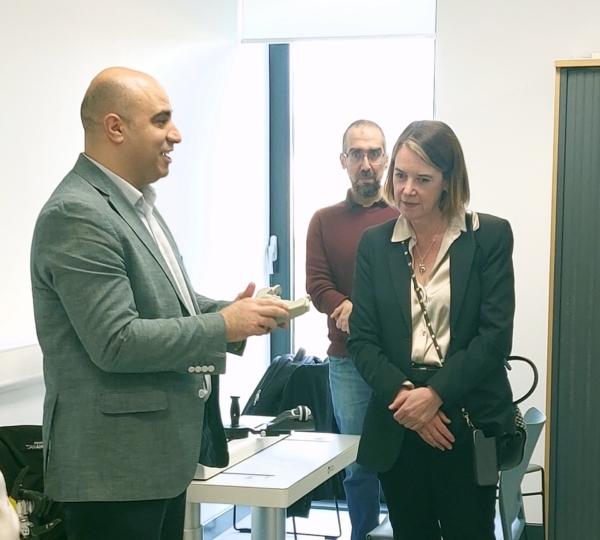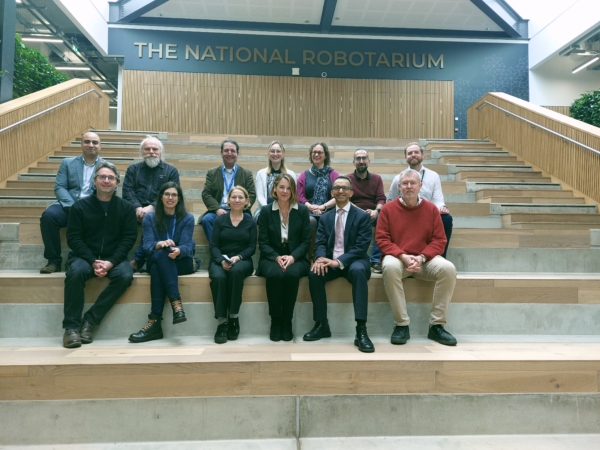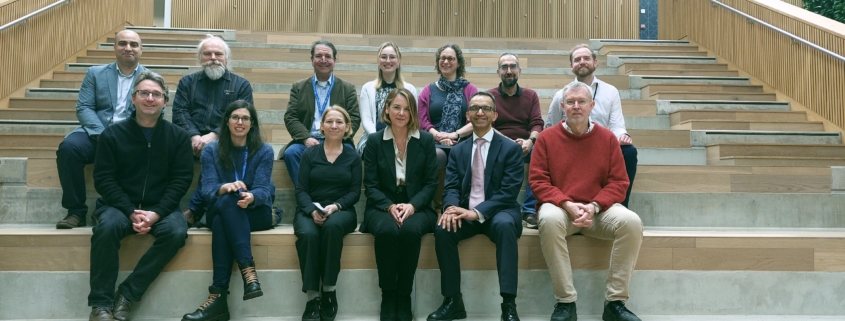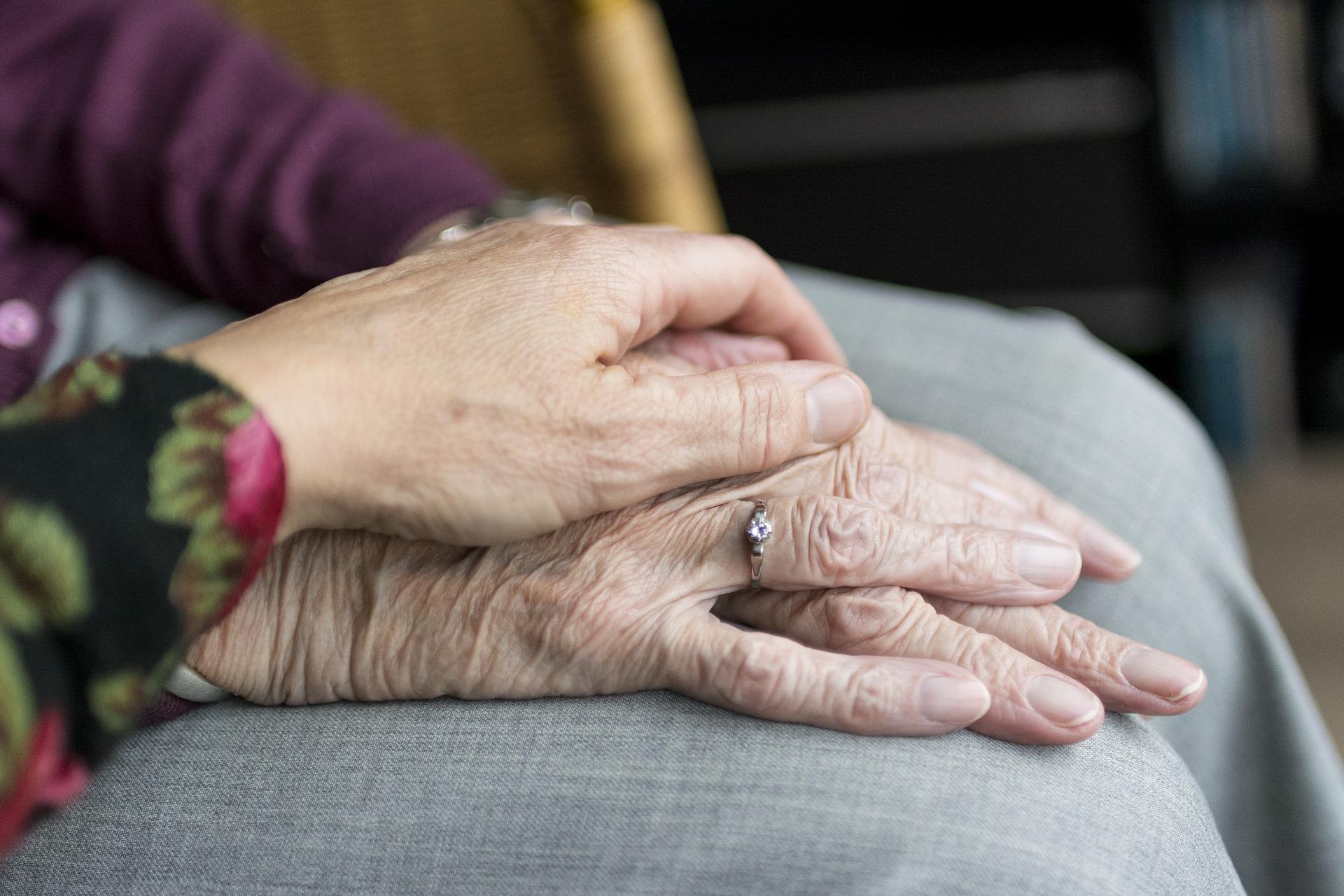Health and social care robots showcased for NHS Scotland Chief Executive
Researchers in Robotics and Artificial Intelligence (AI) from Heriot-Watt University and The University of Edinburgh hosted a visit from Caroline Lamb, NHS Scotland Chief Executive and Director – General Health and Social Care, at the National Robotarium on 18 March. The purpose of the visit was to showcase the latest innovations in robotics for healthcare being developed by scientists.
Led by Professor Lynne Baillie, Heriot-Watt’s world-leading expert in Human-Robot Interaction (HRI), the visit included an introduction from Chief Executive of the Robotarium, Stewart Miller, followed by a tour of the high-spec HRI labs and selection of demonstrations from researchers developing cutting-edge robotics and AI solutions to support people’s health, wellbeing and social care, and reduce pressure on clinical and healthcare staff.

Prof. Kia Nazarpour (University of Edinburgh), Dr Theo Georgiou (Heriot-Watt University) and Caroline Lamb
Examples of research included the FEATHER project, a ground-breaking study that is utilising AI and smart home sensors to monitor living habits and enable the early detection of urinary tract infections (UTIs). The project team, a partnership with the Robotarium and School of Informatics at Edinburgh University, is working with social care and residential homes to develop the smart data systems and help improve patient care for the condition, which affects 150 million people worldwide.
The Horizon Europe project SPRING, led by academic co-lead at the National Robotarium Professor Oliver Lemon, was also featured during the tour, with a demonstration of the socially-assistive ARI robots, which have been providing advice and comfort to elderly patients and those with cognitive decline in a hospital in Paris. Recent news of the study has captured the public’s imagination and garnered significant media interest worldwide.
The varied and comprehensive programme also included talks and visual presentations from Research Assistants and doctoral students from Edinburgh Centre for Robotics covering topics such as robotics-assisted surgery and assessment, automated upper-limb protheses and rehabilitation, robotic exoskeletons, wearable devices to combat drug overdoses, healthcare sensors, long-term monitoring resources for an ageing population, and legged robots.
Caroline was accompanied by Professor Soumen Sengupta, Chief Officer of South Lanarkshire Health and Social Care Partnership, throughout the visit. Following the tour, they joined scientists and business figures from the Robotarium in a roundtable discussion on the future of applications of robotics in the NHS and beyond.

The visit was organised and led by Professor Lynne Baillie (front row, third from left)
Professor Lynne Baillie said: “On behalf of the research teams at Heriot-Watt and The University of Edinburgh, I’d like to express my gratitude to Caroline and Soumen for taking the time to visit the National Robotarium and learn about the wide-ranging robotic applications and solutions we’re developing with input from the health and social care industry.
“As Chief Executive of NHS Scotland and lead of the Digital Health and Care Directorate, Caroline was interested in learning about new innovations that can complement the existing care and support being given to patients across the country.
“Scotland’s population is ageing more rapidly than ever before. That, alongside the pandemic and other public health crises, is putting strain on existing health services, leading to longer waiting lists and staff burnout. We believe that the safe and responsible application of robotics, AI and data could provide solutions to current challenges facing the sector, facilitating independent-living for longer and improving patient wellbeing overall.”
Professor Soumen Sengupta, Chief Officer of South Lanarkshire University Health and Social Care Partnership, said: “Innovation and collaboration with partners across the nation is crucial to how increasingly sophisticated care is being delivered, compassionately, in and with communities.
“Indeed, this is something we are actively committed to in South Lanarkshire and across Lanarkshire as a whole.
“These are challenging times for health and social care services – which further reinforces the importance of innovation and collaboration with strategic partners such as our universities.
“From the stimulating presentations and lively discussions with colleagues from Heriot-Watt University and The University of Edinburgh, it is clear that there is huge scope to build upon the exciting developments that are already being progressed with the NHS in Scotland, and to expand the opportunities for collaboration in relation to social care and housing.
“We all clearly share a common, resolute commitment to the ongoing exchange of learning and experience with a view to harnessing all the potential of technology to enhance the vital work of our health and care staff and to improve the quality of lives across our diverse communities.
“I very much look forward to our harnessing the expertise and enthusiasm that is evident within the National Robotarium to contribute to the transformation of health and social care right across Scotland.”








